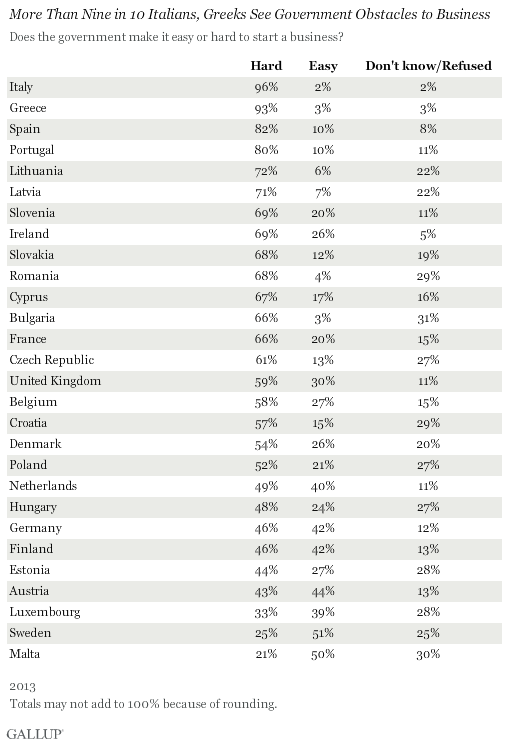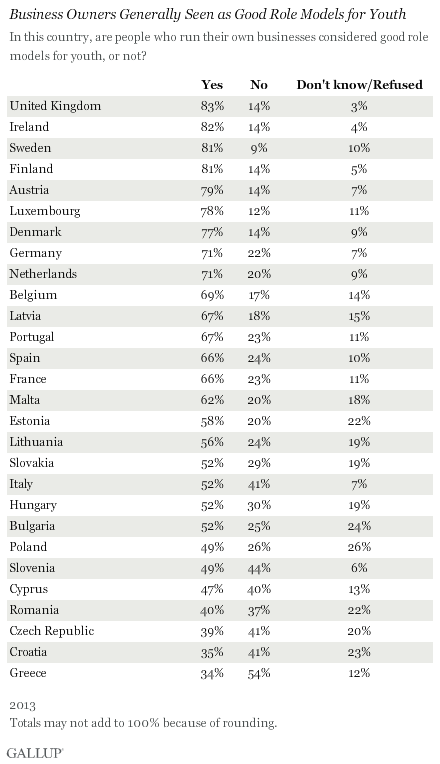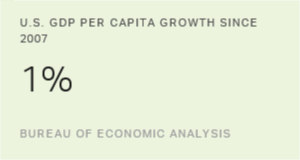WASHINGTON, D.C. -- With jobless rates still high in many countries across the European Union, entrepreneurship could help ease unemployment in some of these nations by opening up new sectors of economic activity that stimulate job creation. However, majorities in many EU countries -- including nearly all Italians and Greeks -- say their government makes it difficult to start a business, potentially discouraging entrepreneurship where it is needed most.

In February, the European Commission raised its 2014 economic growth expectations for the eurozone to 1.2%, chiefly propelled by an anticipated 1.8% increase in Germany's growth. Although recovery is slowly spreading to other countries, growth estimates are meager at most, and their recovery remains fragile as the Commission expects the jobless rate for the entire region to remain near a record 12%.
While residents in most EU countries are more likely to feel the government makes it hard, rather than easy, to start a business, this perception is particularly troublesome to future growth in countries such as Greece and Spain, where unemployment is not expected to drop much lower than 26% this year. New jobs in these and several other European countries will largely need to come from the private sector after austerity measures forced some of the deepest public-sector job cuts in a generation.
But even in Germany, where unemployment is low, removing perceived government barriers to entrepreneurship could help stimulate the investment the country needs to sustain its largely export-driven growth. And, on the plus side for Germany, while nearly half of Germans (46%) say their government makes it difficult for people to start businesses, nearly as many (42%) say their government makes it easy for people to do so.
Business Owners Still Good Role Models
Although many EU residents see government regulations as obstacles in the way of starting a business, investing in mentorship programs that pair current business owners with potential entrepreneurs may be one way to break down these perceived barriers and foster entrepreneurship. Entrepreneurs are viewed favorably in most European countries -- even in Italy where nearly all perceive the government as making it hard to start a business, a majority still see business owners as good role models for young people.

In several EU countries, improving economic conditions may be leading residents to view business more positively. In Germany in 2013, for example, more than seven in 10 adults say business owners are good role models for young people, up from 53% the previous year. Further, young Germans between the ages of 15 and 29 (81%) are even more likely to see business owners as good models, making them ideal candidates as potential mentors or mentees.
Bottom Line
Late last month, EU Commissioner Olli Rehn characterized the EU's recovery as "gaining ground" and suggested that the "worst of the crisis may now be behind us." But he also cautioned that the recovery is "still modest." All EU countries, with the exception of Cyprus and Slovenia, are expected to avoid recession in 2014. However, the situation clearly remains difficult in many member states where unemployment, and particularly youth unemployment, are high and where little relief is expected. Entrepreneurship could be part of the solution to job creation in many of the countries that need the most help, but barriers to starting a business -- either real or perceived -- will need to first come down.
For complete data sets or custom research from the more than 150 countries Gallup continually surveys, please contact us.
Survey Methods
Results are based on telephone and face-to-face interviews with approximately 1,000 adults, aged 15 and older, conducted in 2013 in each country. For results based on the total sample of national adults, the margin of sampling error ranged from ±2 percentage points to ±5 percentage points at the 95% confidence level. The margin of error reflects the influence of data weighting. In addition to sampling error, question wording and practical difficulties in conducting surveys can introduce error or bias into the findings of public opinion polls.
For more complete methodology and specific survey dates, please review Gallup's Country Data Set details.
